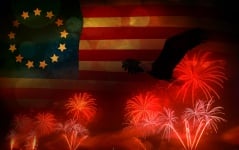THE STAR-SPANGLED BANNER
During the War of 1812, while on the deck of a truce ship, Francis Key paced nervously as a fierce battle raged nearby during the British attack on the harbor of Baltimore. As District Attorney of Georgetown and a spiritual lay leader of his church, Key had been sent by President James Madison to negotiate with the British for a physician who had been taken prisoner. All night Key and his party were detained as the heavy bombardment continued. When the firing suddenly stopped just before morning, Key was fearful of the outcome; but as he looked hesitantly across the water, he saw the American flag still triumphantly flying with the assurance of our nation’s freedom!
With joyful relief, Key wrote his poem hastily on the back of an envelope and put finishing touches on it after being released later that evening. One month later the song was published, accompanied by an old hunting tune, “Anacron in Heaven,” attributed to John Stafford Smith of England. Although enthusiastically received by the people, the song was not officially adopted by Congress as our national anthem until March 3, 1931.
O say, can you see, by the dawn’s early light, what so proudly we hailed at the twilight’s last gleaming, whose broad stripes and bright stars, thru the perilous fight, o’er the ramparts we watched, were so gallantly streaming? And the rockets’ red glare, the bombs bursting in air, gave proof thru the night that our flag was still there. O say, does that star-spangled banner yet wave o’er the land of the free and the home of the brave?
O thus be it ever, when free men shall stand between their loved homes and the war’s desolation! Blest with vict’ry and peace, may the heav’n-rescued land praise the Pow’r that hath made and preserved us a nation! Then conquer we must, when our cause it is just; and this be our motto: “In God is our trust!” And the star-spangled banner in triumph shall wave o’er the land of the free and the home of the brave![1]
Francis Key being overjoyed by the assurance of our nation’s freedom wrote this poem. He included the words “In God is our trust” believing that the victory was heaven sent and God ordained. We are told in Daniel 2:20–21 (NLT) He (Daniel) said, “Praise the name of God forever and ever, for he has all wisdom and power. 21He controls the course of world events; he removes kings and sets up other kings. He gives wisdom to the wise and knowledge to the scholars.
We also read in book Prophets and Kings:
“In the annals of human history, the growth of nations, the rise and fall of empires, appear as if dependent on the will and prowess of man; the shaping of events seems, to a great degree, to be determined by his power, ambition, or caprice. But in the word of God the curtain is drawn aside, and we behold, above, behind, and through all the play and counterplay of human interest and power and passions, the agencies of the All-merciful One, silently, patiently working out the counsels of His own will.…In the history of nations the student of God’s word may behold the literal fulfillment of divine prophecy.
Sometimes we can become fearful of the future and where it will lead, especially when it comes to politics and the social state of this country. But let us remember that God is control, and He will not let anything happen that is outside of His will. Today we enjoy the freedoms we have because God had a role in our beginnings. Let us thank the Lord for our freedoms that we have and may we not take them granted.
[1] Kenneth W. Osbeck, Amazing Grace: 366 Inspiring Hymn Stories for Daily Devotions (Grand Rapids, MI: Kregel Publications, 1996), 203.

